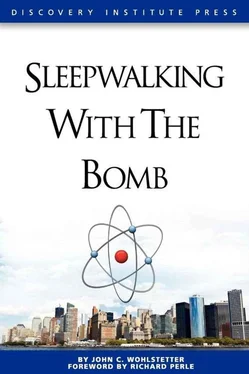John Wohlstetter - Sleepwalking with the Bomb
Здесь есть возможность читать онлайн «John Wohlstetter - Sleepwalking with the Bomb» весь текст электронной книги совершенно бесплатно (целиком полную версию без сокращений). В некоторых случаях можно слушать аудио, скачать через торрент в формате fb2 и присутствует краткое содержание. Город: Seattle, Год выпуска: 2012, ISBN: 2012, Издательство: Discovery Institute Press, Жанр: История, military, Политика, Публицистика, на английском языке. Описание произведения, (предисловие) а так же отзывы посетителей доступны на портале библиотеки ЛибКат.
- Название:Sleepwalking with the Bomb
- Автор:
- Издательство:Discovery Institute Press
- Жанр:
- Год:2012
- Город:Seattle
- ISBN:978-1-93659-906-6
- Рейтинг книги:3 / 5. Голосов: 1
-
Избранное:Добавить в избранное
- Отзывы:
-
Ваша оценка:
- 60
- 1
- 2
- 3
- 4
- 5
Sleepwalking with the Bomb: краткое содержание, описание и аннотация
Предлагаем к чтению аннотацию, описание, краткое содержание или предисловие (зависит от того, что написал сам автор книги «Sleepwalking with the Bomb»). Если вы не нашли необходимую информацию о книге — напишите в комментариях, мы постараемся отыскать её.
RICHARD PERLE, Resident Fellow, American Enterprise Institute and Assistant Secretary of Defense, 1981–1987 Sleepwalking with the Bomb
Sleepwalking with the Bomb — читать онлайн бесплатно полную книгу (весь текст) целиком
Ниже представлен текст книги, разбитый по страницам. Система сохранения места последней прочитанной страницы, позволяет с удобством читать онлайн бесплатно книгу «Sleepwalking with the Bomb», без необходимости каждый раз заново искать на чём Вы остановились. Поставьте закладку, и сможете в любой момент перейти на страницу, на которой закончили чтение.
Интервал:
Закладка:
LESSONS DRAWN FROM THE NUCLEAR AGE DURING ITS FIRST TWO-THIRDS of a century cannot predict every crisis to come. History does not always repeat itself, but if we are to disregard what history teaches we should have good reason to do so—reason grounded in facts, and logical inferences drawn from those facts. We also should hold a keen appreciation of the intractability of human nature and how that nature affects global politics.
The civilized person recoils at the utter moral insanity and ultimate strategic futility of nuclear war. But defending and preserving civilization from its worst enemies, some of highly dubious stability, necessitates considering how to prevent the very real prospect that nuclear weapons will be used for the first time since 1945. The prospect of such a hideous, civilization-altering event seems to be growing as time passes. There is no time to waste in remedying unfortunate turns in nuclear policy and restoring more prudent policies so as to confront emerging nuclear dangers.
The select community of serious nuclear strategists, often satirized as enamored of matters at once esoteric and macabre, diligently and creatively pondered ways to avoid nuclear Armageddon. They got things right enough to help guide the civilized world through the era of super-power contest. Their collected wisdom coupled with history’s nuclear-age lessons offers the civilized world the best—and the last—chance to defeat the emerging, malignant nuclear actors of the twenty-first century before nuclear demons seize the world stage.
The bombs of 1945 generated a powerful current of opinion among leaders and the citizenry—the belief that those blinding atomic flashes had rendered traditional principles of geopolitics and war obsolete. The advent of the nuclear age coincided with the creation of the United Nations, which was to accomplish after World War II’s global carnage what the League of Nations had failed to do after the slaughter of World War I’s trenches. It is understandable that with tens of millions of lives already lost in what was to prove history’s bloodiest century, the prospect of destruction on a vastly greater scale—made possible by the potentially unlimited thermonuclear power of the hydrogen bomb—would drive pacifist passions and utopian yearnings.
Events since 1945 have proven the dolorous refutation of such beliefs and hopes. The nuclear genie is not only still out of the bottle, it has multiplied. Malignant actors are now in possession of nuclear technology and could well have it within their power to fatally wound modern civilization in the not-too-distant future. The five members of the original nuclear club have been joined by four more, with only one of these, Israel, a truly stable democratic state that would not use nuclear weapons save if its literal survival required it. India is a democracy, fairly stable, but going through an economic and social transformation that will test that stability. Pakistan is rife with Islamist fervor and anti-American passions. A mysterious clique of xenophobic tyrants runs North Korea. Iran is approaching nuclear membership but is neither stable nor pacific in its strategic aspirations. Its revolutionary leaders desire to attain regional hegemony in the Mideast, driving American influence to the periphery, and then ultimately to destroy Western civilization.
Despite the clear lessons offered by this history, many have embraced mythic pasts. According to these myths, the threat of extinction posed by an all-out nuclear arms race is sufficient to create a fundamental commonality of interest in mutual survival. Thus patient diplomacy can bring about a nuclear-zero world in which we “end the nuclear nightmare” once and for all. The genie can, in this view, be put back into the bottle after all. There is no serious evidence to support this view. A companion myth is one of benevolent world government, though even a cursory look at the United Nations shows how chimerical such a vision is in real life.
For those who harbor such beliefs, arms control has become a doctrine that transcends geopolitics. Like all utopian beliefs, it is based upon revelatory rather than empirical truth and is thus beyond refutation by concrete evidence in the form of actual events. Arms treaties are inviolate, leading supporters to deny or minimize violations, lest they lead to abandonment of the treaty. Each treaty stands as a step towards nuclear zero. There can be no steps backward on this path. There are, in this view, no undetectable clandestine caches, nor implacable enemies.
Arms-control doctrine further holds that nuclear war is unthinkable because “a nuclear war cannot be won,” and that if somehow a nuclear war starts, the use of even one weapon will inevitably lead to all-out nuclear exchanges. Thus only a truly insane leader could even seriously contemplate starting a nuclear war. And thus the concept of “nuclear superiority” is meaningless, because there can be no winner in a nuclear confrontation. Nuclear weapons are unusable, except to support “mutual assured destruction” as a deterrent to their ever being used. International institutions acting in accord with “world opinion” can mediate seemingly intractable differences between nations. And in saving the human race from mass self-destruction, geopolitics can be redeemed.
But such beliefs presume that our adversaries share our core civilizational values. They do not. These values are scorned by the likes of North Korea’s blinkered Stalinist dictatorship, attempting to use its nuclear bombs for blackmail and to expand international commerce with aspiring rogue nuclear powers. They are scorned by atavist Islamists seeking to seize power in Pakistan so as to gain control over its growing arsenal of nuclear weapons, already about 100 bombs. And they are scorned by the fanatical revolutionary clerics ruling Iran, who might well use nuclear blackmail to undermine the existing world order, starting in the oil-rich and turbulent Mideast. We continually imagine moderates in governments where they are a scarce commodity at best and an extinct species at worst.
During the Cold War doves imagined that each new Soviet leader might prove to be one who would liberalize the system and reach peaceful coexistence. When former KGB chief Yuri Andropov ascended to power upon the death of Leonid Brezhnev, for example, rumors promptly surfaced that Andropov, architect of the bloody suppression of the Hungarian revolt, was a closet liberal who liked scotch and jazz. In fact he liked neither, nor anything else Western and liberal.
Stir into this poisonous nuclear geopolitical brew a Russia that is a stagnant petrostate, consuming its natural resources as its population dies off at a younger average age by the year. Add a China that is determined to vault to preeminence on the world stage, restoring its long-lost greatness via economic primacy and cyber-dominance coupled with regional military intimidation. While neither Russia nor China is a plausible candidate to initiate nuclear war, any shift in the nuclear balance in their favor could alter their behavior during a major crisis, as happened with the former Soviet Union during the 1973 Yom Kippur War.
We would do well under the circumstances to recall the words of Senator Daniel Patrick Moynihan, speaking on the Senate floor about the Reagan administration’s response to the December 1981 Soviet crackdown in Poland: “We court great danger when we invite the contempt of totalitarians.”
If a powerful America is often the object of anger and resentment, it is also feared. But a weak America, far from engendering sympathy, will earn the contempt of allies and adversaries alike. Allies will seek alternative arrangements—including their own nuclear weapons—to secure their position. Enemies will plot potentially lethal trouble. Further, “setting an example” by our own steep arms reductions will not reassure smaller powers like India and Pakistan, who feel threatened and lack a superpower guarantor they trust.
Читать дальшеИнтервал:
Закладка:
Похожие книги на «Sleepwalking with the Bomb»
Представляем Вашему вниманию похожие книги на «Sleepwalking with the Bomb» списком для выбора. Мы отобрали схожую по названию и смыслу литературу в надежде предоставить читателям больше вариантов отыскать новые, интересные, ещё непрочитанные произведения.
Обсуждение, отзывы о книге «Sleepwalking with the Bomb» и просто собственные мнения читателей. Оставьте ваши комментарии, напишите, что Вы думаете о произведении, его смысле или главных героях. Укажите что конкретно понравилось, а что нет, и почему Вы так считаете.












